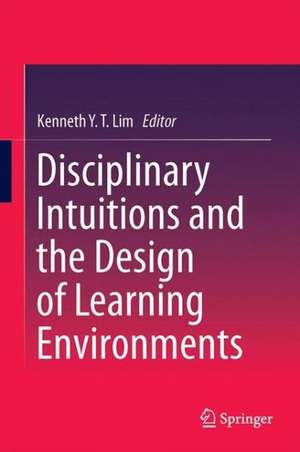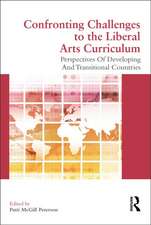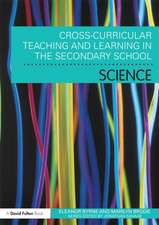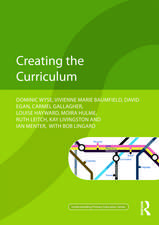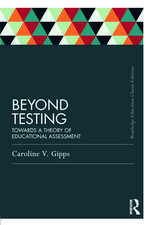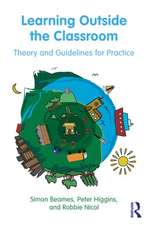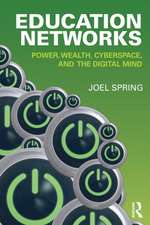Disciplinary Intuitions and the Design of Learning Environments
Editat de Kenneth Y. T. Limen Limba Engleză Hardback – 4 noi 2014
The preceding example was from the natural sciences, but one could just have easily taken an example from, say, the environmental sciences or from the social sciences. Indeed, much of this book does just that, as it seeks to chart the territory of a new theory of learning around Disciplinary Intuitions.
Many of the chapters within draw frequent and explicit linkages to curriculum design, from the premise of the need to go beyond addressing the conceptions of learners, to seeking to understand the substrate upon which these conceptions are founded. The argument is made that this substrate comprises the particular set of lived experiences of each learner, and how – because these lived experiences are as tacit as they are diverse – designing curriculum around misconceptions and preconceptions alone would not lead to enduring understanding from first principles. From this perspective, Disciplinary Intuitions constitute an exciting field at the nexus of learning theories and curriculum design.
| Toate formatele și edițiile | Preț | Express |
|---|---|---|
| Paperback (1) | 384.31 lei 6-8 săpt. | |
| Springer Nature Singapore – 11 sep 2016 | 384.31 lei 6-8 săpt. | |
| Hardback (1) | 391.61 lei 6-8 săpt. | |
| Springer Nature Singapore – 4 noi 2014 | 391.61 lei 6-8 săpt. |
Preț: 391.61 lei
Nou
Puncte Express: 587
Preț estimativ în valută:
74.94€ • 77.95$ • 61.87£
74.94€ • 77.95$ • 61.87£
Carte tipărită la comandă
Livrare economică 14-28 aprilie
Preluare comenzi: 021 569.72.76
Specificații
ISBN-13: 9789812871817
ISBN-10: 9812871810
Pagini: 170
Ilustrații: XXIII, 201 p. 31 illus.
Dimensiuni: 155 x 235 x 20 mm
Greutate: 0.5 kg
Ediția:2015
Editura: Springer Nature Singapore
Colecția Springer
Locul publicării:Singapore, Singapore
ISBN-10: 9812871810
Pagini: 170
Ilustrații: XXIII, 201 p. 31 illus.
Dimensiuni: 155 x 235 x 20 mm
Greutate: 0.5 kg
Ediția:2015
Editura: Springer Nature Singapore
Colecția Springer
Locul publicării:Singapore, Singapore
Public țintă
ResearchCuprins
PART ONE Theoretical and historical foundations.- Chapter 1 Intuitions all around us.- Chapter 2 On the nature of Disciplinary Intuitions.- Chapter 3 Learning through intuition in early China.- Chapter 4 Applying Disciplinary Intuitions to classroom contexts: a constructivist perspective.- PART TWO Delving into Disciplines.- Chapter 5 Developing Disciplinary Intuitions in the Natural Sciences.- Chapter 6 The nature of Intuition in Design.- Chapter 7 From seasons to cisterns - the nature of Geographical Intuition.- Chapter 8 Second Language Intuition: native language and linguistic universals.- Chapter 9 Manifestations of intuitions in the English Language.- Chapter 10 Disciplinary Intuitions in the English Language classroom: implications for practice.- Chapter 11 Surfacing Intuitions through visual novels.- Chapter 12 Mathematical Intuition and storytelling for meaningful learning.- PART THREE Coda.- Chapter 13 Disciplinary Intuitions as Praxis: the role of Intuition in Social Education.- Chapter 14 Misconceptions, Intuitions and Elementary Physics: harnessing everyday understanding in learning environment design.
Notă biografică
Kenneth Y. T. Lim is a Research Scientist at the National Institute of Education, Nanyang Technological University, Singapore. Prior to his appointment, he taught geography and social studies in several schools and junior colleges in Singapore, as well as served as a Curriculum Designer in the Ministry of Education. He received his Masters in Technology-in-Education from Harvard and built on this during his doctoral research on adolescent spatial cognition. Kenneth’s present research interests lie in maker movements and the affordances for learning of fictive worlds and virtual environments, for which he has developed the Six Learnings curriculum framework. As a theory of learning, Disciplinary Intuitions undergirds his work in maker movements and in immersive environments.
Textul de pe ultima copertă
As children, we would have spilt glasses of milk, dropped things, and broken things. As children, therefore, we would have developed intuitions about how the world ‘works’, but we would not necessarily have been able to explain these ‘workings’. It would only have been till we entered formal schooling that we would have learned codifications of canon within each respective discipline, and consequently how to articulate the canon to explain the intuition.
The preceding example was from the natural sciences, but one could just have easily taken an example from, say, the environmental sciences or from the social sciences. Indeed, much of this book does just that, as it seeks to chart the territory of a new theory of learning around Disciplinary Intuitions.
Many of the chapters within draw frequent and explicit linkages to curriculum design, from the premise of the need to go beyond addressing the conceptions of learners, to seeking to understand the substrate upon which these conceptions are founded. The argument is made that this substrate comprises the particular set of lived experiences of each learner, and how – because these lived experiences are as tacit as they are diverse – designing curriculum around misconceptions and preconceptions alone would not lead to enduring understanding from first principles. From this perspective, Disciplinary Intuitions constitute an exciting field at the nexus of learning theories and curriculum design.
The preceding example was from the natural sciences, but one could just have easily taken an example from, say, the environmental sciences or from the social sciences. Indeed, much of this book does just that, as it seeks to chart the territory of a new theory of learning around Disciplinary Intuitions.
Many of the chapters within draw frequent and explicit linkages to curriculum design, from the premise of the need to go beyond addressing the conceptions of learners, to seeking to understand the substrate upon which these conceptions are founded. The argument is made that this substrate comprises the particular set of lived experiences of each learner, and how – because these lived experiences are as tacit as they are diverse – designing curriculum around misconceptions and preconceptions alone would not lead to enduring understanding from first principles. From this perspective, Disciplinary Intuitions constitute an exciting field at the nexus of learning theories and curriculum design.
Caracteristici
Introduces the concept of disciplinary intuitions, and foregrounds the tacit proto-understandings and sensings as distinct from prior knowledge Explores the design of curricula and technology-augmented learning environments for more enduring understanding Initiates a provocative debate into contemporary understandings of curriculum design with regards the nature of intuitions as varying across traditional subject domains Includes supplementary material: sn.pub/extras
